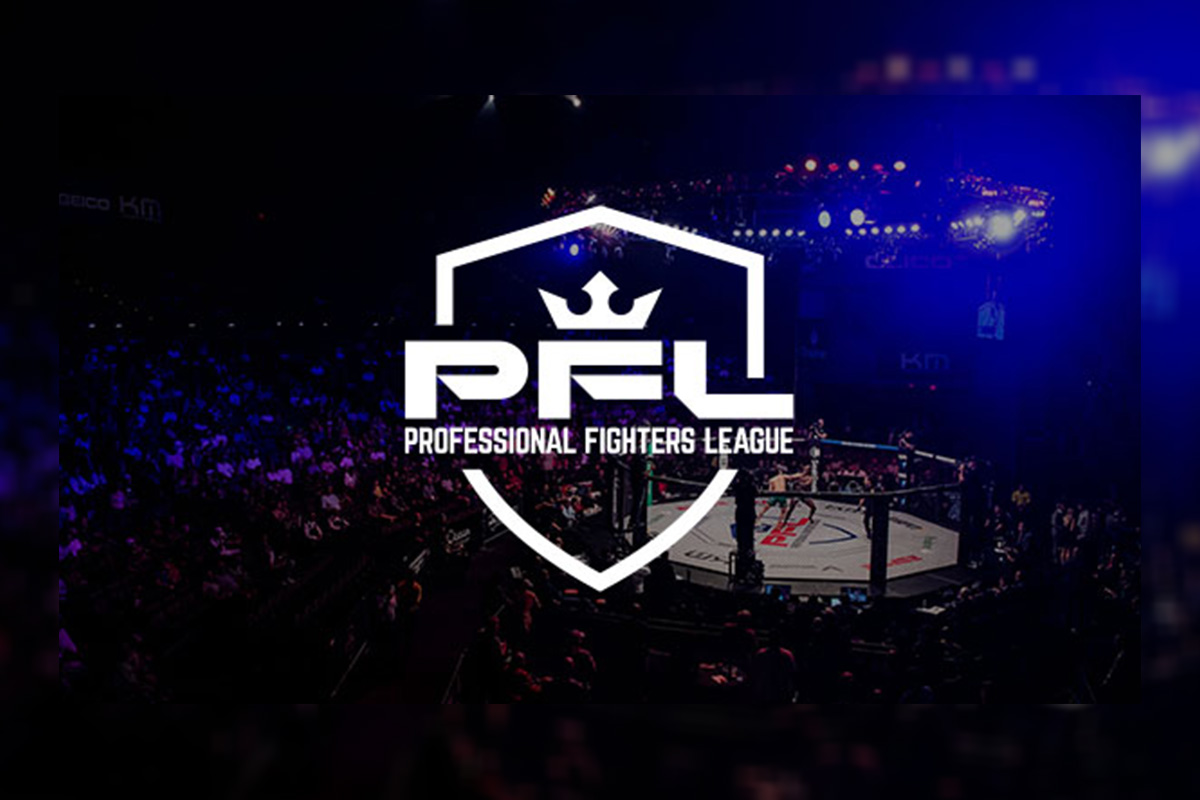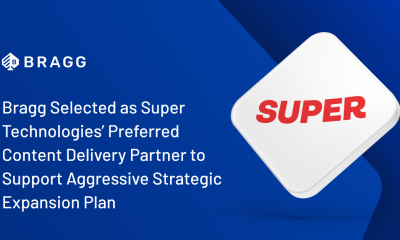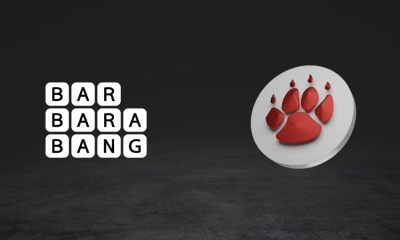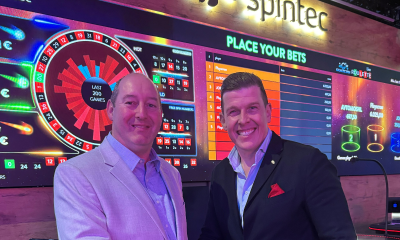GameOn
GameOn Partners with Professional Fighters League (PFL) to Launch Next-Gen Fantasy Games

GameOn, a next generation fantasy sports platform partnered with the world’s best sports leagues to launch, operate, and monetize web3 games, announced a deal with Professional Fighters League (PFL), the fastest growing and most innovative sports league in the world. GameOn will launch playable collectibles and next-gen fantasy games based on real world PFL fighters and events.
PFL is the #2 MMA company globally and the only with a sports-season format where individual fighters compete in Regular Season, Playoffs, and World Championship. Each weight division competes for a $1 million prize. The league has propelled itself into the co-leader of the sport and recently signed combat sports superstars Jake Paul and Francis Ngannu to fight exclusively in MMA for the PFL.
The news is off the back of last month’s funding led by Lightning Capital and Flow, the blockchain platform started by NBA Top Shot maker Dapper Labs. The funds are being used to accelerate GameOn’s PLAYN3XT platform and acquisition of major league partners. Dapper Labs has pioneered the broader sports collectibles market which doubled in 2022 to $2.6b, and is projected to reach $41.6b by 2032.
“We can’t wait to bring next-gen fantasy sports to millions of MMA fans worldwide. We’re focused on major league opportunities that leverage our built and scalable PLAYN3XT platform. Our priority is onboarding the world’s best leagues and executing highly-profitable revenue growth,” said GameOn CEO Matt Bailey.
“We’re thrilled to be joining forces with GameOn to strengthen the digital bridges we have with fans around the world. PFL and GameOn are dynamic companies who are leveraging cutting-edge tech to deliver the next generation of sports fandom,” said PFL CEO Pete Murray.
The PFL fighter roster is global and world-class, with fighters from over 20 countries and 25% independently ranked in the top 25 in the world. PFL leads in technology and innovation, with its proprietary PFL SmartCage powering real-time betting and a next-gen viewing experience. PFL airs live in the US on ESPN and ESPN+ and in 140 countries via 25 leading broadcast and streaming partners.
B2B Marketing Strategy
The Power of the Lead-Up: Why Visibility Before ICE Defines Success

Article by Vikki McCausland, Head of Account Management
In a lot of industries, the first few weeks of the year are about catching up with the ‘let’s circle back in January’ tasks and slowly easing your way back into your work routines.
In iGaming, especially within marketing departments, January provides no such luxuries. This is the time of year when iGaming companies and marketing teams have to be at the top of their games. Why are we so busy, you ask? One word: ICE.
Building Momentum
ICE is the industry’s premier event. It brings together iGaming’s biggest names and companies under one roof.
While the event may be the best part of a month away, the companies that will perform best in Barcelona are those that are planning. It is not enough to simply show up and attend the event; the companies that will succeed in Barcelona are those that have thought ahead, crafted their narratives, and have a clear strategy.
To say ICE can feel like an Olympic event might feel like an exaggeration, but anyone who has spent their time running up and down those halls will know how tough those few days can be.
It is competitive. People are vying for attention, and trying to grab people spontaneously on the day can be even more difficult. A carefully considered pre-ICE marketing plan can be highly effective in saving you time and ensuring you schedule the talks and the time you need.
Releasing News
From a news perspective, ICE can also be another minefield. Everyone has some sort of announcement to make, and generating buzz, especially for smaller businesses, is challenging, to say the least.
Getting ahead of this and building momentum as you head into the event is a much smarter strategy. With so much competition for headlines and attention during ICE week, making major announcements before the event and securing some pre-ICE exposure can be a brilliant way to stand out.
The effects of this are two-fold: firstly, you do not have to compete with major companies that can dominate headlines if they drop big announcements during the event. Secondly, getting attention ahead of the event means that you have a talking point for it and that you can secure the kinds of meetings you want ahead of time.
A Structured Narrative
The smartest businesses are the ones that do not just treat ICE as an isolated event. Their marketing departments, much like ours, go into ICE mode early and begin to build their narratives for the event. Whether this is pre-event announcements, Q&As or just social media buzz.
This continues after the event, as you shape the narrative around your announcements and develop future plans based on any discussions and new partnerships you have built.
Having this fully fleshed-out plan also signals to the wider industry that you are a serious participant, not just an opportunistic exhibitor seeking short-term attention and capitalising on industry chatter.
Getting your pre- and post-ICE strategy in place with no support can be challenging. At GameON, our work for ICE starts long before we sit down on that plane to Barcelona. We speak with our clients in the weeks and months leading up to the event, carefully planning the narrative they want to build and helping them capitalise on the opportunities the event can create.
A Victory Lap
ICE can, undeniably, be a time of stress and high activity. Still, with proper planning, it can be a productive few days where you can achieve everything you need to, chat to the people you want, and even enjoy a few sangrias in the Catalonia sun.
This planning should be a carefully curated roadmap covering press releases, editorials, social media, and booking management. Crafting this strategy requires exactly the kind of expertise our team is equipped to offer at GameOn.
When executed right, ICE should feel like a victory lap. A well-planned and executed exhibition that showcases your business and positions you precisely as you want to be. It should be the culmination of your efforts, not a last-minute scramble to make sure you can grab a tiny bit of time with potential partners.
The post The Power of the Lead-Up: Why Visibility Before ICE Defines Success appeared first on Eastern European Gaming | Global iGaming & Tech Intelligence Hub.
AI
Movers and Shakers – From Data to Decisions: What It Really Takes to Make AI Work in iGaming

Reading Time: 3 minutes
“Movers and Shakers” is a dynamic monthly column dedicated to exploring the latest trends, developments, and influential voices in the iGaming industry. Powered by GameOn and supported by HIPTHER, this op-ed series delves into the key players, emerging technologies, and regulatory changes shaping the future of online gaming. Each month, industry experts offer their insights and perspectives, providing readers with in-depth analysis and thought-provoking commentary on what’s driving the iGaming world forward. Whether you’re a seasoned professional or new to the scene, “Movers and Shakers” is your go-to source for staying ahead in the rapidly evolving iGaming landscape.
By Claudia Heiling, Co-Founder & COO, Golden Whale
For years, iGaming has considered itself a data-driven industry. We’ve all spent time refining segmentation, optimising CRM journeys, mapping behavioural signals, and building increasingly complex player models. And with machine learning now widely available, whether bought, built, or borrowed, it would be reasonable to assume that the industry is already fully realising the benefits of AI.
But speak to most operators, product teams, or data leads and you’ll hear a different story.
There are models running somewhere – and usually several. There are predictions being generated. There are dashboards, reports, and insights circulating. Yet the business impact often feels inconsistent. Some initiatives deliver a clear uplift; others stall or never make it past a proof-of-concept stage. Projects that shine in testing environments don’t always translate into live, reliable operations.
The issue is rarely the model. And it’s rarely the data team. The gap is operational.
It’s one thing to build machine learning models. It’s another to make them function as part of the daily working rhythm of an iGaming business.
The operators and providers seeing the strongest and most reliable gains are the ones who treat AI not as an experiment, but as a capability: something that must be designed, deployed, monitored, re-trained, and continuously improved. This is closer to how we already treat core game operations, promotional systems, risk tooling, or CRM orchestration. It’s iterative, structured and ongoing.
In practice, that means building the frameworks around the models, not just the models themselves. Continuous data flows. Automated re-training. Real-time deployment pipelines. Feedback loops that allow systems to learn not just once, but constantly. When we work with iGaming clients who have embraced this operational mindset and leverage our ready-to-deploy MLOps system built for iGaming, the impact becomes both compounding and predictable.
The other shift happening is cultural. There has been a lingering expectation in some corners of the industry that AI will replace manual decision-making entirely and that it will “take over” processes like CRM optimisation, fraud detection, or product adjustment.
That’s neither realistic nor particularly desirable.
iGaming is too contextual, too human, too dependent on craftmanship and intuition.
The real value of AI is in augmentation: giving teams better visibility, faster feedback, and stronger evidence on which to base decisions.
In organisations where this mindset has taken hold, you see a different dynamic.
CRM teams run more experiments, more often, because they aren’t spending time rebuilding segments from scratch. Analysts spend less time on manual spreadsheet simulation and more on strategic exploration. Live-ops managers can respond to player behaviour as it changes, not after the weekly report comes in.
AI becomes the layer that enhances judgement, rather than replaces it.
And when AI is integrated technically and culturally, the commercial outcomes are hard to ignore. In setups where continuous learning pipelines are properly established and aligned with live operations, we’ve seen engagement and retention metrics improve dramatically and sustainably, with activity and revenues rising by 100–200%, while bonus and incentive costs drop by 20%+, driving growth and both securing and expanding market share. Operational teams benefit too, with workflows becoming smoother and less manual because the system is handling the constant data processing and iteration.
The improvements don’t come from having more complex algorithms. They come from having a structure that allows those algorithms to perform reliably, adapt to change, and keep learning over time.
This is where the conversation about AI in iGaming is quietly changing.
It’s no longer dominated by model performance or dataset scale, rather it is focused on repeatability, reliability and learning speed.
The distinction matters because it separates having AI, from running AI.
And the operators and providers who get this right aren’t just improving performance in the short term. They are building organisational momentum, a capability that compounds over time and is very difficult to replicate quickly.
In a sector defined by tight margins, competition and rapidly shifting player expectations, that advantage is significant.
So, if there is a “next step” in the industry’s AI journey, it’s not a more complex algorithm. It’s not a bigger data pool. And it’s not a new suite of predictive dashboards.
It’s the ability to learn continuously, responsibly and at scale.
Because in iGaming, as in intelligence, data alone doesn’t win. What wins is the ability to turn learning into action again and again.
The post Movers and Shakers – From Data to Decisions: What It Really Takes to Make AI Work in iGaming appeared first on European Gaming Industry News.
BETER
Movers and Shakers: 24/7 Content, Strict Integrity, and Constant Feedback – BETER’s Approach to Sustainable Partnerships

Reading Time: 4 minutes
“Movers and Shakers” is a dynamic monthly column dedicated to exploring the latest trends, developments, and influential voices in the iGaming industry. Powered by GameOn and supported by HIPTHER, this op-ed series delves into the key players, emerging technologies, and regulatory changes shaping the future of online gaming. Each month, industry experts offer their insights and perspectives, providing readers with in-depth analysis and thought-provoking commentary on what’s driving the iGaming world forward. Whether you’re a seasoned professional or new to the scene, “Movers and Shakers” is your go-to source for staying ahead in the rapidly evolving iGaming landscape.
We spoke with Oleg Onegov, Head of Strategic Partnerships & Account Management at BETER, about the fast-betting provider’s approach to cultivating, strengthening, and sustaining relationships with partners.
Can you tell us about your career journey and your current role as Head of Strategic Partnerships & Account Management at BETER?
I’ve been working in the betting and iGaming industry for several years, mainly focusing on client relations and business development. Over time, I realised that my strongest skill was in building long-term partnerships and helping clients derive real business value from the products they use. At BETER, I lead the Strategic Partnerships & Account Management team, focusing on ensuring we deliver not only content but also help operators and aggregators grow with it—whether through improved integrations, new products, or data-driven insights. This is critical to scaling BETER’s presence in the esports and sports ecosystem. My role also sees me work closely with internal and external stakeholders to deliver value-driven solutions that support operational excellence and long-term commercial goals.
Different operators and aggregators have different needs. How do you and your team ensure that BETER’s products and solutions remain in demand and are continuously aligned with each client’s evolving business and market changes?
BETER is renowned for providing 24/7 live streaming, real-time data, and hyper-accurate odds for approximately 700,000 fast-paced esports and sports events annually, offering up to 50 markets per event with an average operator margin of 7.5% or higher.
Our esports portfolio includes ESportsBattle tournaments featuring eFootball, eBasketball, eHockey, and eTennis. Our sports portfolio includes the Setka Cup table tennis series, BSKT Cup basketball league, GTR Cup tennis tournaments, and Padel tennis, as well as coverage of official cricket tournaments and leagues worldwide.
In addition to our fast-paced content, we offer a comprehensive Esports Odds Feed, delivering market-leading odds with the highest uptime for more than 450 tournaments worldwide. This includes over 40,000 pre-match and live events annually across popular titles such as CS 2, Dota 2, League of Legends, Valorant, and more.
We are also continuously working on obtaining regulatory approvals in all major markets globally, including U.S. states such as New Jersey and Colorado, where our content is live on bet365’s local domains.
When it comes to ensuring that our products remain in demand and aligned with each client’s evolving business and market changes, our approach is never “one size fits all.” My team and I maintain close communication with every partner to ensure we’re consistently meeting their needs. Some clients aim to maximise esports engagement, others focus on traditional sports, while some want to experiment with new formats such as eTennis or Padel—or even launch fully branded, customised tournaments like our dedicated eFootball series designed specifically for operator needs.
We constantly review performance data, align on KPIs, and adjust delivery or features accordingly. Moreover, our product roadmap is highly flexible—we prioritise developments that bring the most value to our clients’ business models. Ultimately, close collaboration with operators and aggregators helps us understand regional specifics and tailor our products to different markets, while our agility in implementation and regulatory readiness give partners confidence that BETER’s solutions will continue to fit their evolving needs.
Many companies emphasize client success at the start of a relationship, but sustaining it over time is much more challenging. What specific processes, practices, or approaches does BETER use to support clients throughout the entire journey and ensure that partnerships grow into long-term, trust-based relationships?
At BETER, client success is ongoing. My team runs regular business reviews and performance check-ins, where we don’t just present numbers but also propose explicit next steps. We involve product managers at the beginning of new partnerships, so clients can see how their feedback translates into real improvements. Transparency is also key, and we share daily reports, monitor incidents in real time, and communicate openly if something needs fixing. This kind of consistency and accountability builds trust and makes our partnerships long-lasting.
Feedback loops are vital. How does BETER work with client feedback, and in what ways does it influence your product development and solution improvements?
Feedback is at the core of how we evolve. We collect it in various ways, including through structured NPS surveys, regular calls, daily chats, and even during integration discussions. Every input gets logged and shared across product, trading, and IT teams.
Many of our most successful launches, such as new esports markets for Dota 2 and CS 2 titles in our coverage of tournaments worldwide, came directly from client requests. Our eTennis series also originated from a product discussion sparked by a client’s feedback, which expressed the need for completely new offerings for their bettors.
What matters is not just listening, but also closing the loop and showing the client how their feedback shaped the roadmap and what the result looks like in practice.
What are the most important pillars of BETER’s operations that operators or aggregators pay the most attention to—both when entering into a partnership and throughout the entire collaboration?
From my experience, there are four pillars clients care about most.
First is content quality and variety — at BETER, we offer fresh and engaging disciplines such as eFootball, eBasketball, and eTennis, supported by diverse game formats.
Second is reliability, especially when it comes to uptime, latency, and the accuracy of our data feeds and live streams. That’s why our team works tirelessly to maintain the highest possible uptime across all our products.
Third is integrity and compliance — operators need confidence that the product is fair, transparent, and secure. Our dedicated Integrity team ensures that only 0.01% of matches have been flagged as suspicious.
Finally, there’s our approach to partnerships — we’re not just a provider; we act as an extension of our partners’ teams, ready to adapt and innovate together.
This combination of high-quality content, operational excellence, trust, and genuine collaboration is what keeps our partnerships strong from day one — and well into the future.
The post Movers and Shakers: 24/7 Content, Strict Integrity, and Constant Feedback – BETER’s Approach to Sustainable Partnerships appeared first on European Gaming Industry News.
-

 Amusnet6 days ago
Amusnet6 days agoWeek 7/2026 slot games releases
-

 Aphrodite’s Kiss6 days ago
Aphrodite’s Kiss6 days agoLove on the Reels: Slotland Introduces “Aphrodite’s Kiss”
-

 Brino Games6 days ago
Brino Games6 days agoQTech Games integrates more creative content from Brino Games
-

 Denmark7 days ago
Denmark7 days agoRoyalCasino Partners with ScatterKings for Company’s Danish Launch
-

 Baltics7 days ago
Baltics7 days agoEstonia to Reinstate 5.5% Online Gambling Tax From March 1
-

 Booming Games7 days ago
Booming Games7 days agoTreasure Hunt Revival — Booming Games Launches Gold Gold Gold Hold and Win
-

 Bet Rite7 days ago
Bet Rite7 days agoSpintec Expands into Canada with Bet Rite
-

 ELA Games7 days ago
ELA Games7 days agoELA Games Unveils Tea Party of Fortune — A Magical Multiplier Experience































